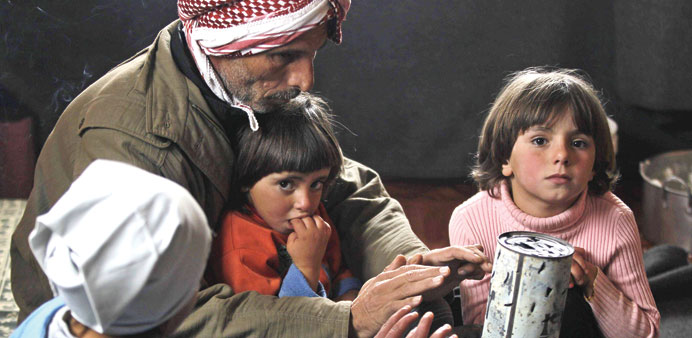A Syrian refugee family warm up at their caravan after heavy rain at the Zaatari refugee camp in the Jordanian city of Mafraq, near the border with Syria, yesterday. Weather conditions in the camp north of Jordan worsened as the country faced winter storms yesterday.
AFP/Beirut
They fled air strikes and shelling, but many of Syria’s 3mn refugees have found little comfort elsewhere, suffering in squalid camps and risking death to reach Europe’s shores.
In Lebanon, many crowd into makeshift shelters in agricultural fields that will soon be blanketed in thick snow, and in Egypt they have faced government crackdowns and deportation.
A lucky few have found asylum in Sweden or Germany, but many more have ended up in the EU’s poorest nation Bulgaria, held in overflowing shelters.
Some of the estimated 3mn Syrian refugees are treading paths well-worn by economic migrants from Niger, Eritrea and elsewhere - people fleeing poverty as much as conflict.
Together, they have boarded boats barely worthy of the name, travelling from Africa to Europe, or Asia to Australia, and paying thousands of dollars to unscrupulous traffickers for the privilege.
Despite a planned peace conference in Geneva next month, almost three years into the conflict, aid groups expect the crisis to grow further in 2014, even as donations fail to keep pace.
The massive flow of refugees from Syria has strained the capacity of surrounding nations, including Lebanon, which has felt the crisis most acutely.
It is hosting more than 825,000 registered refugees, but likely closer to a million in total, representing a quarter of its population.
Its borders have remained open, but the government has refused to allow the establishment of formal refugee camps.
Instead, refugees have set up makeshift, unofficial camps, many dotted across the eastern Bekaa Valley - a stark counterpoint to bucolic vineyards that Beirut residents visit for weekend lunches.
Their shelters are constructed of refuse plastic sheeting slung over wooden frames, and the earth underfoot quickly churns to mud when it rains.
“Winter here is something terrible,” says Fatima Hanhoun, from Syria’s western Idlib province, who lives on a piece of land in the Bekaa.
“Last year the ground was completely water laden, we couldn’t step outside the tents without sinking up to our knees in water and dirt.”
Roberta Russo, spokeswoman for the UN refugee agency UNHCR, said the sheer size of the influx into Lebanon this year posed a major challenge.
“In December last year, we had less than 200,000 and now we are at 830,000,” she said.
“And the funding has not increased proportionally.”
In Jordan, 130,000 Syrians live in the UN-run Zaatari camp, a dusty refuge so desolate that many residents want to leave.
“The only solution is to return to Syria, because this camp is nothing but a huge prison,” said Hassan Nashwa.
One of the year’s most visible influxes of refugees came in August, when some 50,000 people walked across the border between Syria and Iraq into the country’s autonomous Kurdish region.
In Turkey, around 600,000 Syrians are scattered throughout the country, only a quarter in camps.
The rest fend for themselves as best they can. In Istanbul, whole families with children sleep in the open in local parks.
Many beg to survive, unable to find work in a country with an unfamiliar language.
In Egypt, Syrians found themselves the target of attacks after the July ouster of Islamist president Mohamed Mursi, who was publicly supportive of the Syrian uprising.
But other countries have been more welcoming, with Sweden announcing it would grant residency to all Syrian asylum seekers who reach its territory.
The Hodl family bought false Belgian passports to escape Syria and arrive in Sweden, but for Khaled the trip was worth it.
“We want to live here and get Swedish nationality,” he said, adding that now he imagines his daughter growing up as a doctor.
But the lure of European asylum has ended with disappointment for thousands of refugees who sought to enter the EU from Bulgaria, the union’s poorest country.
Its three refugee facilities have been quickly overwhelmed and new arrivals are housed in dilapidated former schools or deserted army camps.
“If we knew what we would find, we never would have come here,” Abdul Jalal Bonja told AFP at the Harmanli camp in southeast Bulgaria, as children waded barefoot through freezing puddles.
And the search for a safe haven has proven deadly for some Syrians, who have boarded rickety boats in a bid to reach Europe.
Their plight is caught up with those of economic migrants fleeing the Middle East and Africa - hundreds of whom died in early October in two shipwrecks off the coasts of Italy and Malta.
The accidents prompted soul-searching in Europe, but many nations with already stretched resources are reluctant to open their doors to refugees or migrants.
Aid agencies warn that nations most tested by the Syrian crisis, including Lebanon, are likely to see increasing tensions between local residents and refugees.
The issue was highlighted this month, when Lebanese villagers set a Syrian camp alight after accusing four refugees of rape, despite a doctor saying the allegations were baseless.
Russo said UNHCR is now focusing on reducing tensions by bolstering impoverished towns flooded by refugees.
“If we continue like this, the tension that is already increasing is only going to escalate. The situation could degenerate.”

